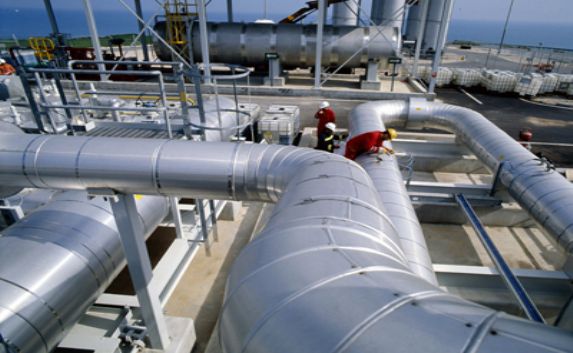
Trans-Anatolia Gas Project: Vast Impact of Azerbaijan’s Initiative
Publication: Eurasia Daily Monitor Volume: 9 Issue: 124
By:

The Azerbaijani-Turkish Trans-Anatolia gas pipeline project (TANAP), officially launched on June 26 (see EDM, June 27), is impacting a vast field ranging from Turkmenistan, across the South Caucasus and Turkey, to Central Europe and EU authorities in Brussels.
This project encourages Turkmenistan to pursue a trans-Caspian pipeline to Azerbaijan and link up with the Trans-Anatolia pipeline. By the same token, it stimulates the EU to work more actively with Ashgabat toward that goal, as seen in recent days. TANAP enhances Georgia’s transit role and, correspondingly, Georgia’s significance to European interests. This project offers Turkey the chance to become a significant energy transit (not “hub”) country. The Trans-Anatolia project marks the start of implementing the EU-desired Southern Gas Corridor to Europe.
With TANAP, major Western companies and consortiums find it necessary to revise earlier decisions, so as to accommodate the new project. Through TANAP, countries along the Nabucco-West route (Bulgaria-Romania-Hungary-Austria-Germany) seek a meaningful diversification of gas supplies to reduce their dependence on Russia. Just two days after TANAP’s official launching, the Shah Deniz gas producers’ consortium in Azerbaijan selected Nabucco-West (eliminating British Petroleum’s rival project) to be the route for Caspian gas into Central Europe (Dow Jones, 1News.Az, June 28).
Baku, which set these dynamics in motion, is the driving factor of the Trans-Anatolia project in all major respects. Azerbaijan came up with the policy initiative, gas supply commitment, investment capital, project conception and planning, and effective decision-making to drive it. Azerbaijan’s initiative with this project reinforces the country’s strategic choice of a Western orientation. Baku introduced TANAP when similar European projects were moribund without gas, financing, or any coherent decision-making in the European interest. Instead of this, four rival European pipeline projects were competing against each other – three of them non-strategic or redundant.
Azerbaijan cut that Gordian knot with the strategic TANAP project. First proposed in October 2011, the project gained wide acceptance within months – an unprecedentedly short time-span for projects of this scale and ambition. This project is deemed strategically necessary and commercially viable, in contrast to the earlier ones. The European Commission regards the Trans-Anatolia project as an integral segment of the planned Southern Gas Corridor to Europe. The overall system potentially involves a trans-Caspian pipeline from Turkmenistan to link up with TANAP. The Shah Deniz consortium has already decided to triple the capacity of the South Caucasus Pipeline (also known as Baku-Tbilisi-Erzurum pipeline), from seven billion cubic meters (bcm) to 21 bcm per year, to be fed into TANAP when the latter is built (see EDM, June 7).
As planned in Baku, TANAP meets the EU’s basic criteria: a “dedicated” pipeline for Caspian gas to Europe; carrying non-Russian gas on a route that bypasses Russia; governed by an EU-compatible and enforceable legal and regulatory regime in non-EU territory; registered in the EU; designed to be gradually scalable for growing gas volumes, and oriented to European gas markets that require differentiation of supplies to reduce dependence on Russia. This latter factor makes Nabucco-West the logical continuation route of the planned Trans-Anatolia line into EU territory.
It is the TANAP project that makes possible and necessitates the Baku-Tbilisi-Erzurum pipeline’s capacity expansion. Fundamentally, TANAP has revived the Nabucco project, now reconfigured as Nabucco-West, to connect TANAP with Central Europe. With the Baku-Tbilisi-Erzurum, TANAP, and Nabucco-West pipelines, a complete chain of supply can result, reaching all the way from the Caspian offshore wellhead to European buyers.
From Azerbaijan’s national perspective, the Trans-Anatolia pipeline would organically connect Azerbaijan via Turkey with Europe (a major economic and political goal of Baku). It would turn Azerbaijan into a significant contributor to energy security in Europe. TANAP would cast Azerbaijan in the new role as natural gas exporter, in addition to oil exporter. And it can add a third role for Azerbaijan, as transit country for Turkmenistani gas via Turkey to Europe.
TANAP contributes significantly to cementing Azerbaijan’s relationship with Turkey, economically and politically. This is a fundamental national-security issue for Baku, given the challenges it faces in this region. Azerbaijan was until very recently a pure “consumer” of Turkish investments, goods, services and political support. This will continue and even increase, but Baku is now reciprocating as a “provider” to Turkey. With Azerbaijani oil and gas, Turkey achieves its goal to become an energy transit corridor (an ambition that Ankara pursued in vain with Russia or other producer countries until now). Moreover, Baku is rapidly emerging as a major source of direct investment in Turkey. The Trans-Anatolia project (with Baku as majority shareholder) is worth up to $7 billion in investments on Turkish territory. This year, Baku undertook a further commitment to invest $6 billon in overhauling Turkey’s petrochemical sector (see EDM, April 12). Altogether, Baku plans to invest some $15 billion in Turkey from 2012 through 2017 (Trend, June 22, 25).
The Trans-Anatolia project confirms that the transit of Caspian energy supplies to Europe crucially depends on Azerbaijan. Conversely, without Azerbaijan, no transit project would be possible between Asia and Europe in the South Caucasus. Geographically, this proposition held true all along. But Azerbaijan’s role has now advanced from the merely geographical to the functional and proactive. In parallel with TANAP, Azerbaijan undertakes to finance and complete the construction of the Kars-Tbilisi-Baku railroad (with a ferryboat link to the eastern Caspian shore), connecting the railroad networks of Europe and Central Asia via Turkey and the South Caucasus. Thus, Baku initiates and implements large-scale projects of European interest from its own natural and investment resources, and with business rationale buttressed by strategic rationale.




